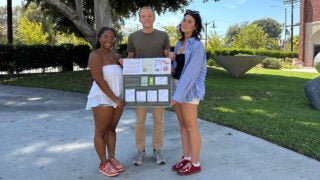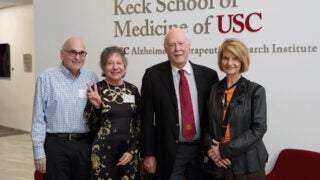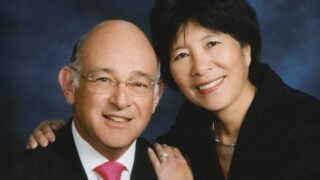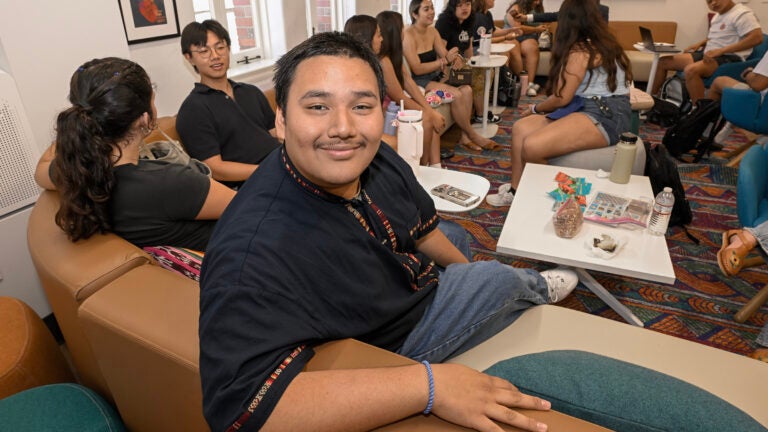
New student Patrick Cardenas-Hirsig enjoys a break at the La CASA open house this month. (USC Photo/Gus Ruelas)
USC’s Latinx/e Heritage Month: A time to celebrate ‘agents of change’
Students and faculty share thoughts on this year’s theme and their hopes for the future.
As USC kicks off Latinx/e Heritage Month this week with the theme of “Agents of Change — Shaping the Future Together,” several Trojan students and faculty members spoke with USC News about who they consider to be agents of change within the Latino community.
Freshman Patrick Cardenas-Hirsig of the USC Gould School of Law immediately said Dolores Huerta, the iconic American labor leader, civil rights activist and recipient of an honorary degree from USC in 2023.
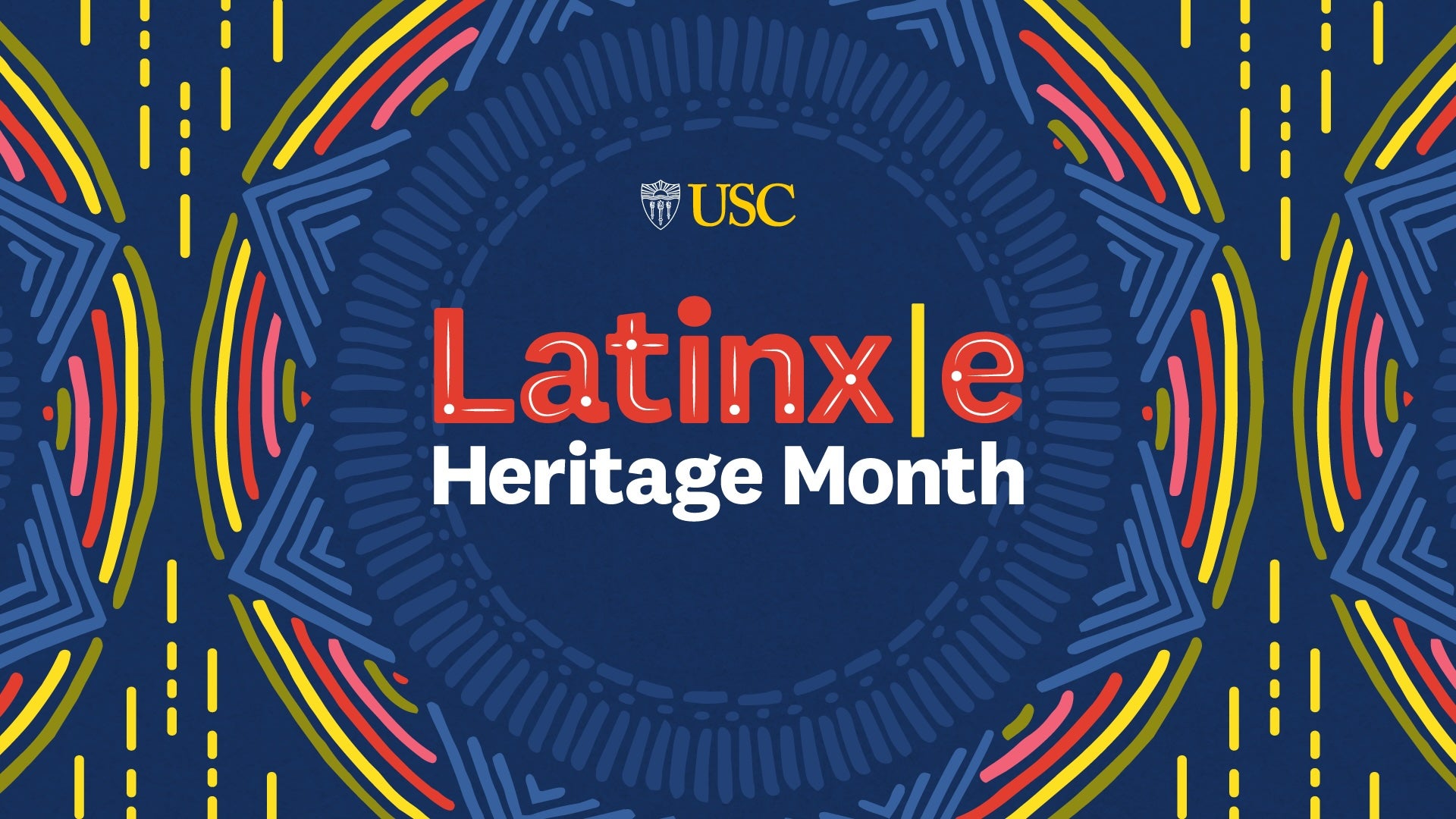
But Cardenas-Hirsig, who was born in Jalisco, Mexico, quickly amended his answer to include an even more significant role model in his life: his mother, Anna Cardenas.
“It would be a mistake to not mention my mom,” Cardenas-Hirsig said as he attended an open house recently at La CASA, the student center for Latino Trojans. “She was always involved in our community organizations, helping find employment for people. Growing up and seeing what my mom does really pushed me to want to help people, to advocate for people.”
Graduate student Erick Trevino of the USC Annenberg School for Communication and Journalism said during the La CASA event that if not for the trailblazing efforts and encouragement of his parents, Guadalupe and Monica Trevino, he doesn’t think he would have moved out of Laredo, Texas, and pursued his journalism studies in California.
“I’m sure other first-generation students feel as I do about how much effort our parents put in to get us to where we are right now,” Trevino said. “That motivates me to work as hard as I do.”
Senior Paula Acedo of the USC Dornsife College of Letters, Arts and Sciences, who works as a culture ambassador at La CASA, said during an interview at the open house that family members and educators “who practiced empathy before they practiced judgment” helped propel her along the way to USC. She now looks forward to graduation and becoming a change agent in her own right — but has no intention of forgetting the lessons she’s learned.
“We are a generation that is very open to new things, but we also are a generation that’s not very open to old things,” Acedo said. “I think we need to come from a place where we not only tolerate, but we can respect the opinions of other people — those who are older than us and those who are younger than us.”
‘Strong and independent’ change agents
Darline P. Robles, associate dean for diversity and community engagement at the USC Rossier School of Education, said in an interview that she’s not surprised that some Latino students look to their parents as the most important agents of change in their lives.
“They know the struggles that their parents went through, and yet they persevered,” Robles said. “They gave them the strength to go forward.”
Robles also paid tribute to three “strong and independent” change agents in particular: former United States Ambassador to Argentina Vilma Socorro Martínez; California Community Foundation CEO Antonia Hernández; and the late lawmaker Gloria Molina, who served in the California State Assembly, the Los Angeles City Council and the Los Angeles Board of Supervisors.
“These three women are all very humble and very much of our culture,” Robles said. “To see them accomplish and do so much for the Latino community, it was always inspiring. I think young people who met them and knew their story truly believed that we could all do more.”
The price of change — and progress
USC Dornsife Distinguished Professor Natalia Molina pointed out that while the words “courage” and “bravery” come to mind when talking about agents of change, “along with that comes a real vulnerability.”
Molina points to the example of American civil rights activist and retired nurse Sylvia Mendez. At the age of 8, Mendez played an instrumental role in the landmark 1947 desegregation case Mendez v. Westminster, which paved the way for the eventual end of segregated education. The young student’s family successfully sued in federal court when a “whites only” school in Westminster, Calif., denied Mendez enrollment.
“She ended up facing discrimination for the rest of her years at her school,” Molina said in an interview. “There’s a vulnerability in terms of having to walk into a school where you are bullied, and you may face the threat of violence. The hero narrative overshadows that because we like to look at the best parts of ourselves, not necessarily the dark, dark parts.”

The professor also celebrated renowned L.A. muralist, artist and activist Judy Baca, whose most well-known works are part of The Great Wall of Los Angeles, a half-mile-long mural depicting the history of California through images of significant figures and historic events from diverse and traditionally marginalized communities. Baca also painted a mural located at USC’s Ronald Tutor Campus Center.
“Sometimes being an agent of change is talking about difficult topics and shedding light on difficult moments in history,” Molina said. “[Baca] has had to be vulnerable in terms of being open to critique and maybe not getting the recognition or resources she needs to do these projects. She is an example of being an agent of change by standing by your convictions.”
Latinx/e Heritage Month runs nationwide each year from Sept. 15 through Oct. 15. At USC, a month of events will culminate with a Noches de Cultura event with live entertainment, food and speakers in Founders Park at USC’s University Park Campus.
“During Latinx/e Heritage Month, we honor the trailblazers of the past whose courage paved the way,” said Maria Romero-Morales, USC’s assistant chief diversity officer for communication, community and student engagement, in a statement. “We are uniting in our shared aspiration for a future where our community dreams continue to inspire progress and unity.”
See the USC Calendar of Events for all Latinx/e Heritage Month activities.

